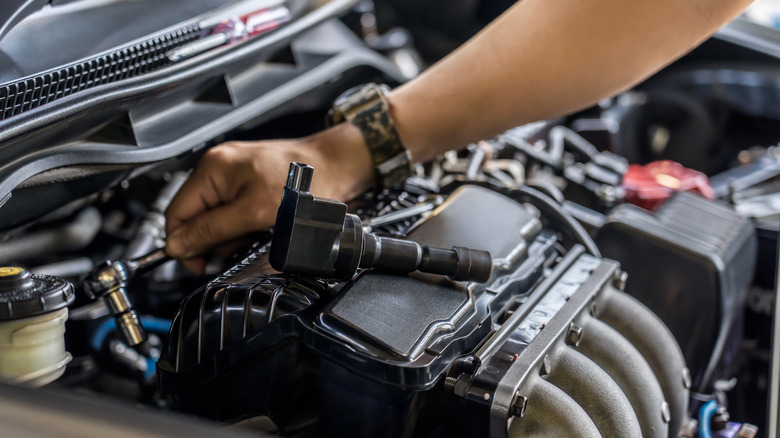How Often Do You Actually Need To Change Your Car's Spark Plugs?
As their name suggests, spark plugs, the small, screw-like parts of an engine, create a spark of electricity that begins the combustion process to start a car. And let's be honest: most drivers don't think to replace them regularly. However, just because you don't think about it doesn't mean your vehicle isn't suffering as a result unless you have a diesel engine.
Like most car issues, there isn't a universal number of miles that your spark plugs need replacing once you cross. Some manufacturers suggest getting new spark plugs as often as every 30,000 miles, while others say you shouldn't worry about it until you travel 50,000 or upwards of 80,000. However, the general rule of thumb is that you should replace your spark plugs at least every 100,000 miles. But each manufacturer differs, so you should consult your owner's manual to see how often your car's make and model needs new plugs.
Neglecting to replace your spark plugs regularly could impact your engine in the long term. Given their drastic importance in the engine, a bad spark plug could result in your car's engine failing to function altogether. Thankfully, there are plenty of great spark plug brands to choose from, so there's no lack of options.
How to know when you need new spark plugs?
Now that you know how often you should replace your spark plugs, you need to be able to see the signs of a faulty plug. Naturally, when something is wrong with your engine, your check engine light is the primary signal, which applies to spark plugs. Sometimes, the light may even flash when your spark plugs need replacing.
Another sign is if your car is having trouble starting. Spark plugs are vital for an engine to work correctly, so if your vehicle stalls when you turn the key, the problem could be your spark plugs. They can also impact your gas mileage, as a faulty spark plug can prevent your engine from working as efficiently as possible. If you notice you need to fill up more often, you might need to change your spark plugs. Similarly, your car won't accelerate as quickly if you have a bad plug, so if you have any engine performance issues, it could be the cause.
If somehow you don't notice any of these changes and your check engine light isn't on, trust your ears. Engines are supposed to hum consistently, but your spark plugs may be to blame if you hear any strange noises. Rattling is the most common, but if your engine makes any strange noises, it's best to get it checked as soon as possible.

